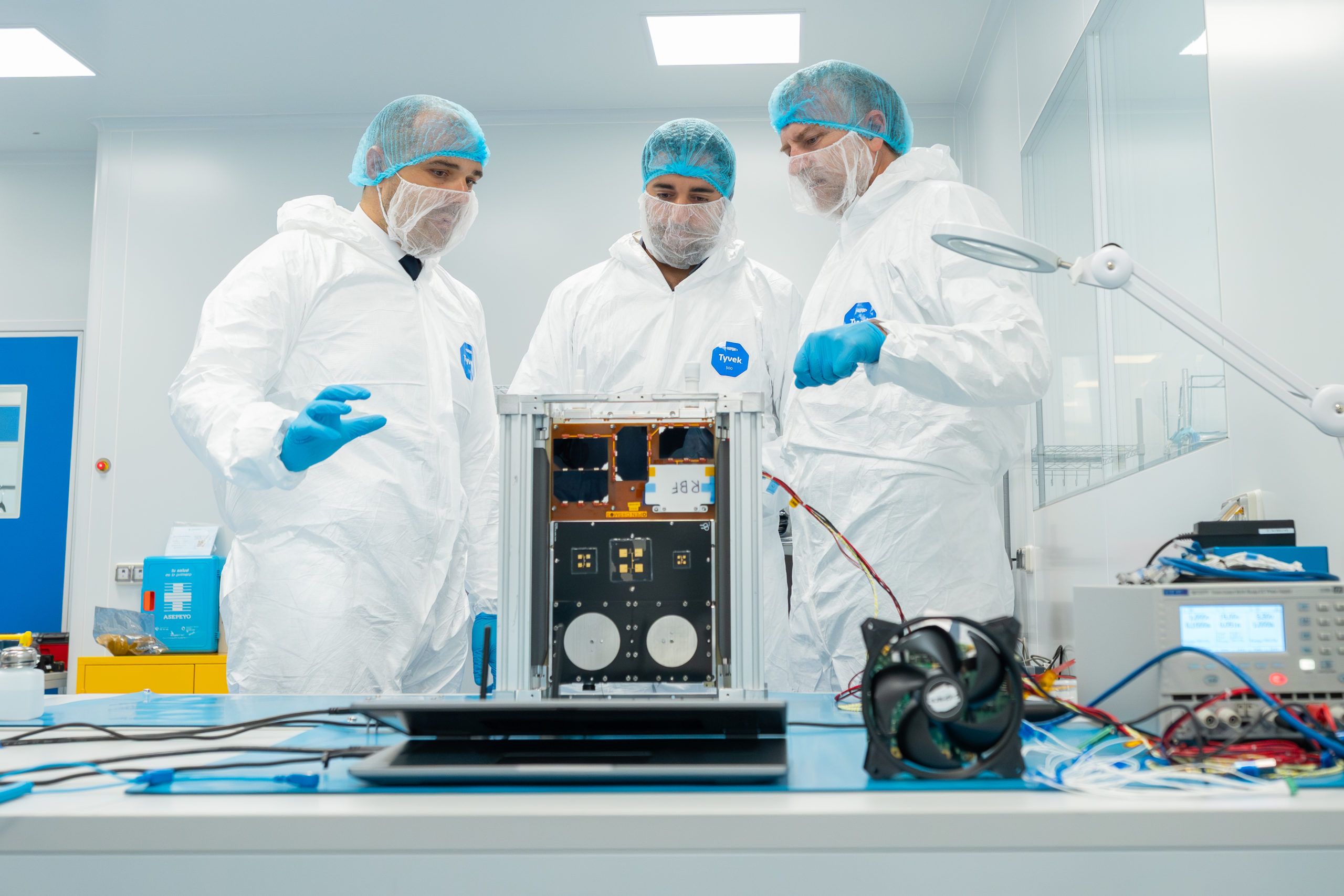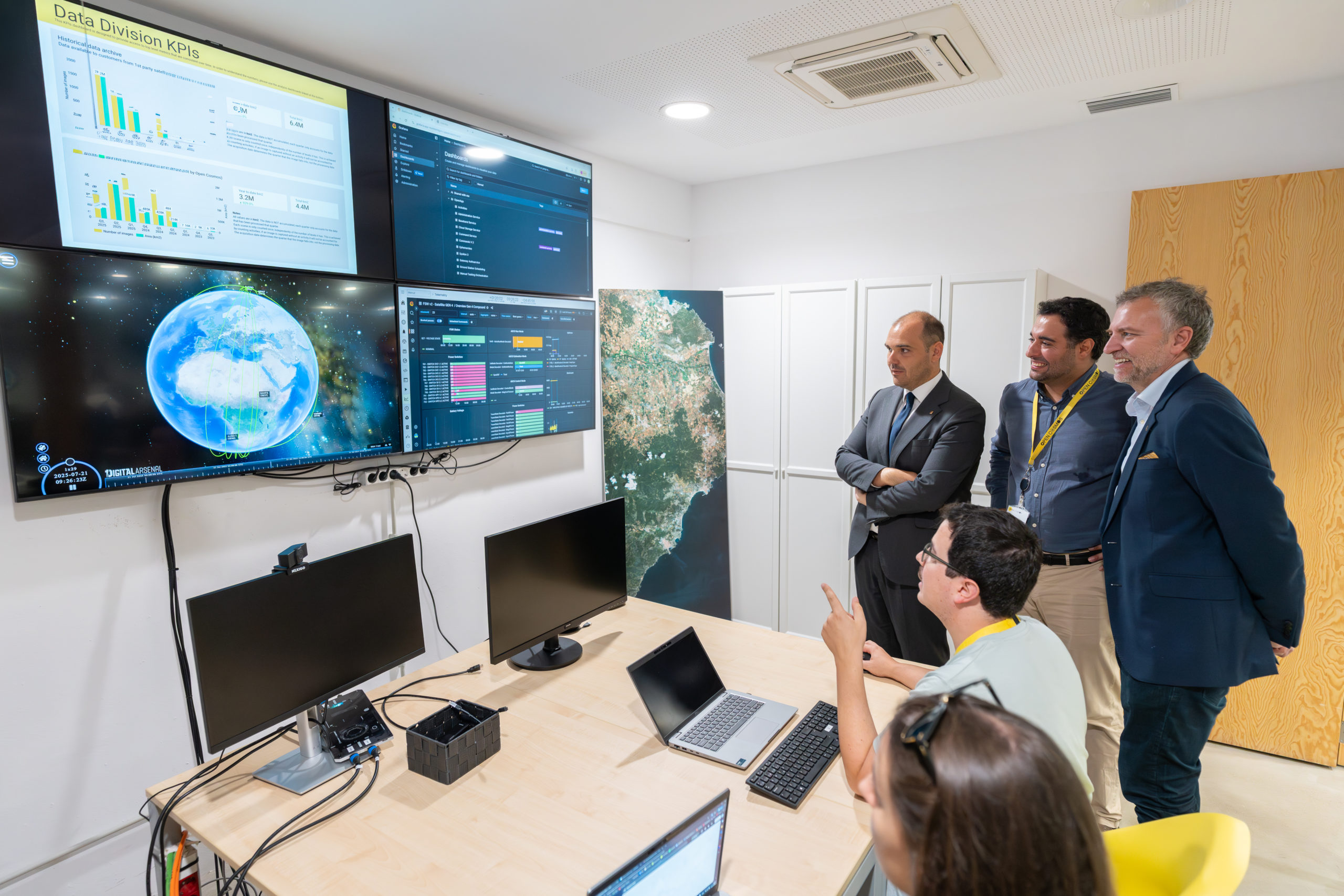
Keep up to date with our innovative initiatives.
Sign up here
The Minister of the Presidency of the Government of Catalonia and President of the Board of Trustees of the i2CAT Research Centre, Albert Dalmau, has visited the facilities of the Catalan company Open Cosmos in Barcelona to see the progress of the 6GStarLab satellite manufacturing, Europe’s first open 6G research laboratory in Low Earth Orbit (LEO). During the visit, Sergi Figuerola, PhD, Director of i2CAT, accompanied the Minister.

The Minister of the Presidency visits the satellite accompanied by the director of i2CAT and the CEO of Open Cosmos.
The 6GStarLab, a pioneering project led by i2CAT, will focus on the research and development of non-terrestrial networks (NTN) and enable the experimental validation of new communication technologies in a real space environment. It is the first satellite of its kind to be promoted across Europe. It will be an open and flexible testbed that will allow the remote deployment and execution of experiments, fostering innovation in an emerging ecosystem that works towards interconnection between terrestrial and non-terrestrial networks.
Non-terrestrial networks utilise nodes, such as satellites or high-altitude platforms, to transmit information. They are crucial because they complement terrestrial networks, extending connectivity to remote or isolated regions where traditional infrastructure cannot reach. This integration creates hybrid networks that improve communications performance and provide a seamless user experience. They are fundamental to bridging the digital divide, providing access to essential services on a global scale and making a key contribution to advanced 5G and future 6G.
To make this project a reality, i2CAT has awarded a public contract to Open Cosmos for a value of € 1.65 million. The award covers the design, manufacture, integration, launch and commissioning of the 6GStarLab satellite. The manufacture of the satellite is currently taking place in the Open Cosmos clean room, a controlled environment where rigorous testing is carried out to ensure optimal performance before launch and deployment into orbit. The satellite is scheduled for launch in the last quarter of this year and is expected to be operational for research purposes in early 2026. The manufacture of the 6GStarLab has represented a milestone for Open Cosmos, which, for the first time in Catalonia, has carried out the complete manufacturing and validation process of the satellite— from design to testing—entirely at its facilities in Barcelona. These facilities, which include a new clean room inaugurated just over a year ago, significantly expand the company’s capabilities and strengthen the Catalan business fabric in the space sector. The Barcelona facility joins Open Cosmos’ other sites in the UK, Portugal and Greece.

Another moment from the institutional visit to the Open Cosmos headquarters in Barcelona
The 6GStarLab will incorporate high-tech payloads designed by i2CAT and the Catalan company Microwave Sensors and Electronics (MWSE). It will also include a space-to-ground optical communication laser terminal and the corresponding ground station from the Singapore-based company Transcelestial. The NanoSat Lab group at the Universitat Politècnica de Catalunya (UPC) will develop the antenna array for radio frequency communications.
For its part, i2CAT’s Space Communications research group has led the conceptualisation of the mission and the design of the 6GStarLab payloads. The work planned by the research team focuses on three main lines of research: an optical ground-to-space communications link, 6G communications protocols (Direct-to-Device and Broadband), and orchestration and autonomy.
Optical ground station in Móra la Nova
The i2CAT-driven mission also foresees a ground segment in Móra la Nova, from where the 6GStarLab satellite experiments will be controlled. The equipment will include an optical ground station that will enable two-way ground-to-space laser communications. This station, a pioneer in Catalonia, will facilitate research into optical space communications for the transmission of high-speed data for both download and upload. This optical technology is a precursor of the quantum communications of the future and will allow the development of more precise signalling systems for connections between satellites. The ground segment will also include a Ka-band tracking station, a key technology for future non-terrestrial 6G networks. The ultimate goal is to integrate terrestrial and non-terrestrial 6G networks to provide global and ubiquitous connectivity, which is essential for delivering broadband services on a large scale.
The 6GStarLab infrastructure, both in orbit and on the ground, will lay the foundations for new applications with a significant impact on society. Thanks to its technology, it will improve communications in rural and isolated areas, facilitating access to essential services such as telemedicine and distance learning. It will also contribute to the prevention and mitigation of fires and other natural disasters, promote autonomous mobility by connecting intelligent vehicles, and establish a new generation of secure communications, essential to protect government, financial, business, and personal systems from growing cybersecurity threats.
In parallel, i2CAT plans to strengthen research in the fields of artificial intelligence, cybersecurity, and the extension of connectivity through non-terrestrial networks, as well as the publication of research results for the scientific community. In this sense, the 6GStarLab infrastructure will be available to the scientific and technological community interested in exploring and experimenting with future communications, thereby fostering the development of innovative solutions in various sectors and aligning with the roadmap developed by the European Space Agency (ESA) in the field of 6G.
This project is part of the programme for the Universalisation of Digital Infrastructures for Cohesion UNICO I+D 6G, promoted by the Spanish Government within the Recovery, Transformation and Resilience Plan and financed with NextGenerationEU funds. In total, i2CAT has obtained 10 million euros from the subprogramme of infrastructures and scientific-technical equipment for the deployment of various research infrastructures.